Evidence-based resources for parenting, education and family life.
Members' login“We will go to the ends of the earth for you, because we know you would for them.”
“We will go to the ends of the earth for you, because we know you would for them.”
Dedicated to applying the world's best research to parenting and to future-proofing our children through impactful, evidence-based resources
Tooled Up is forschools
Tooled Up saves staff time and promotes home-school alignment. Our platform of over 1000 evidence-based resources have been researched and created in response to questions from Tooled Up staff in our schools all over the world. If busy staff can't find what they need, we create it for them. Simple.
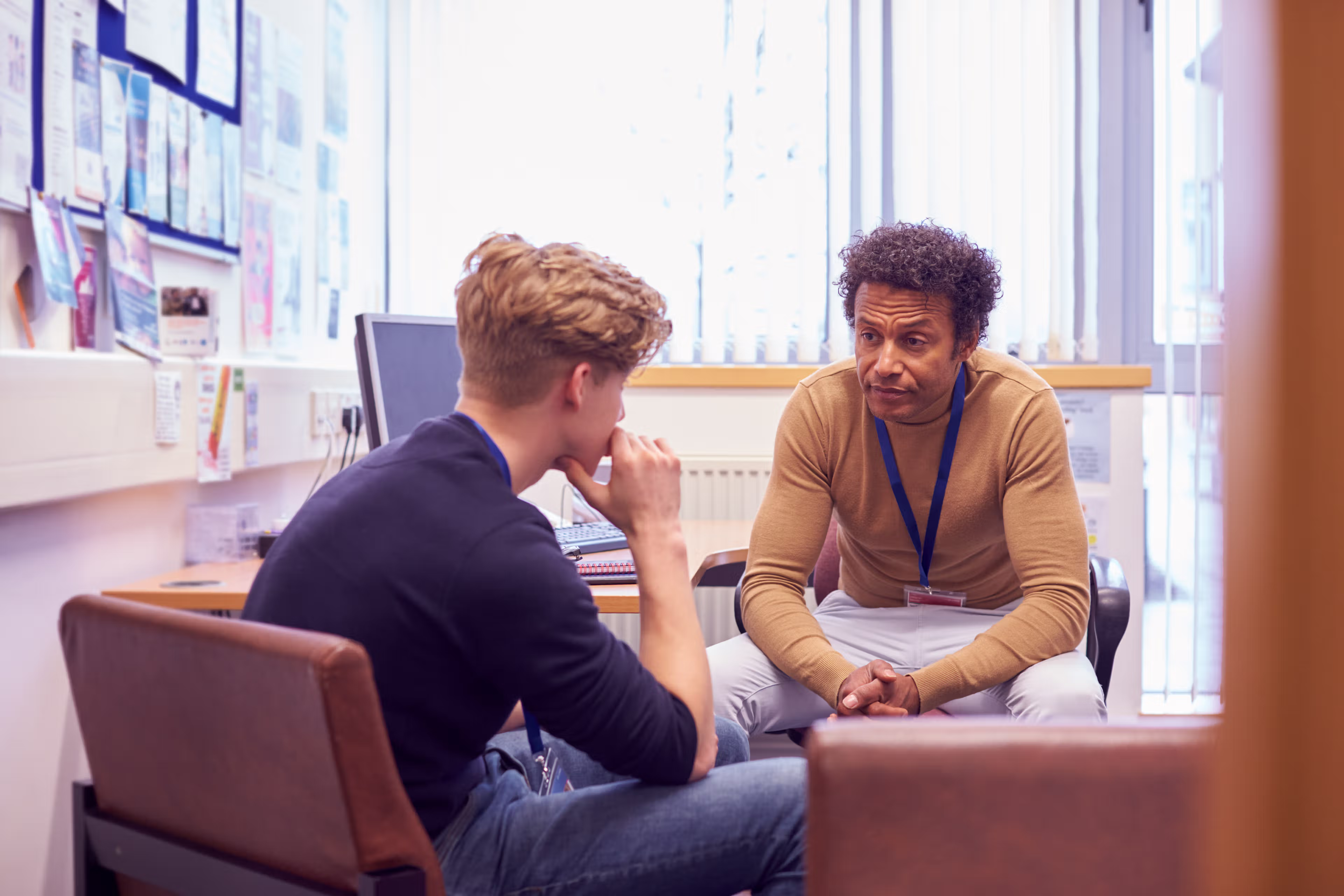

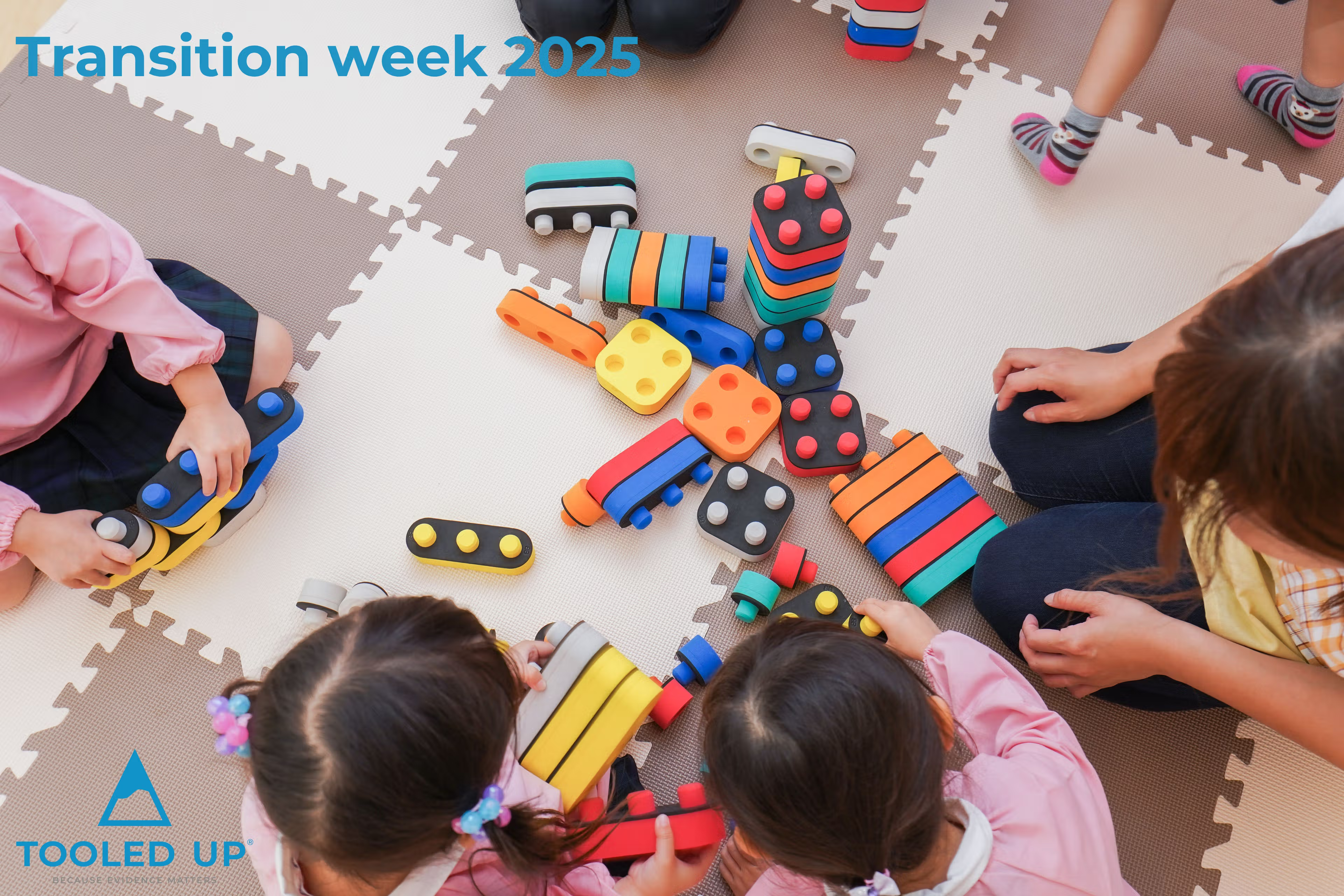
Starting Nursery or Pre-Prep School: a parent's guide to starting on the right foot
2 Jun 2025 / 19:00 - 20:00pm BST
Dr Kathy Weston
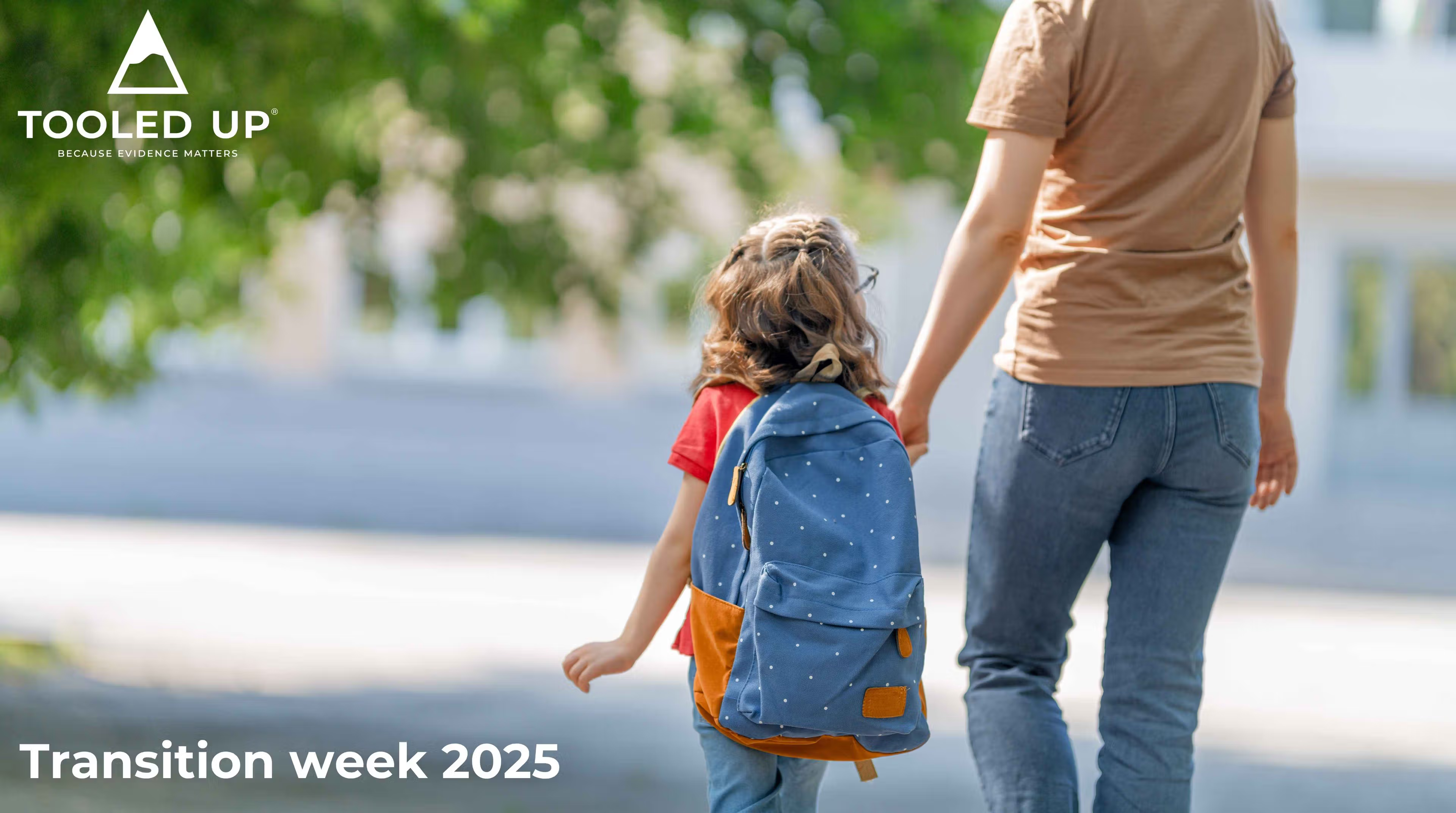
Starting Prep or Primary School: a parent's guide to hitting the ground running
3 Jun 2025 / 19:00 - 20:00pm BST
Dr Kathy Weston
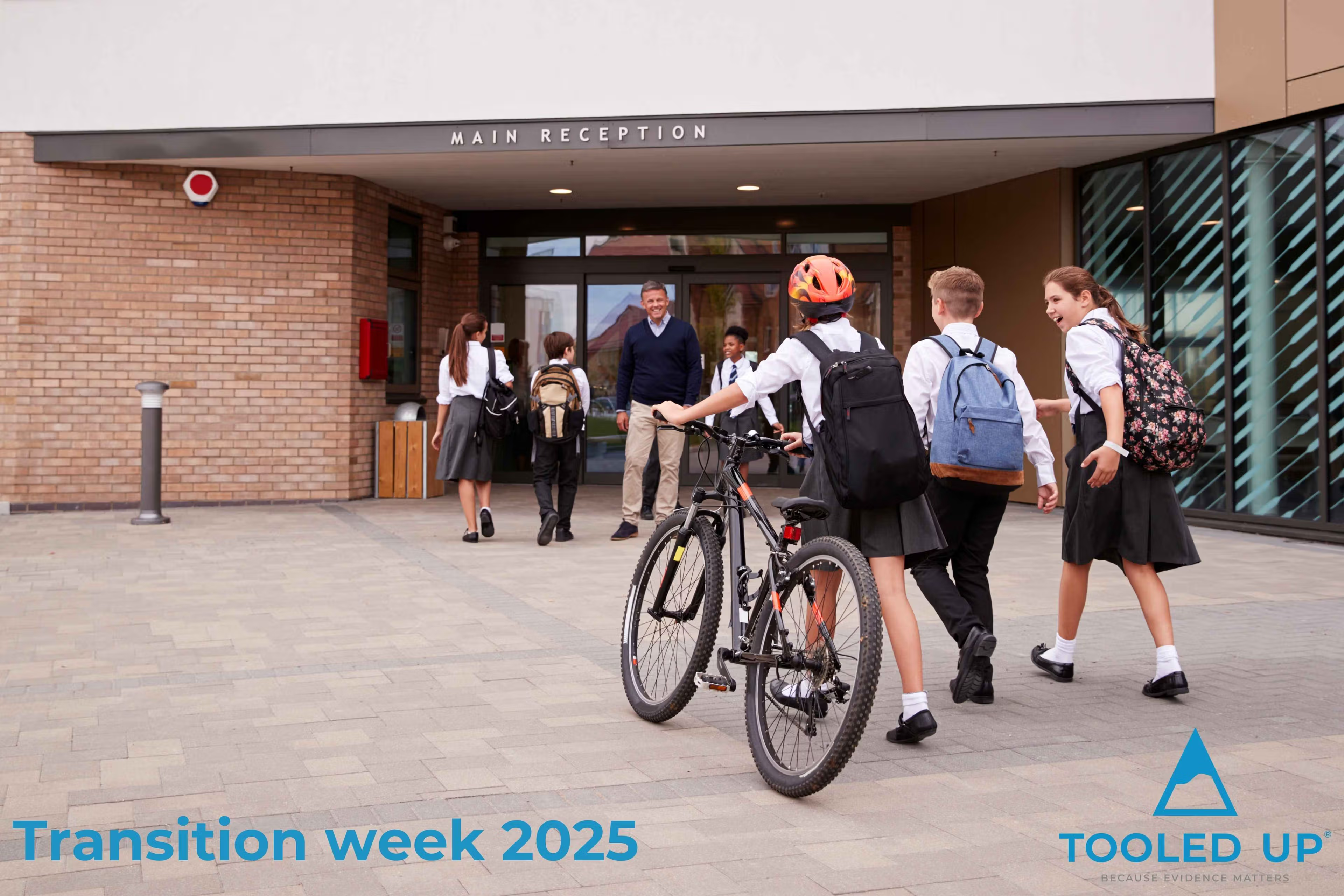
Starting Secondary or Senior School: a parent's guide to equipping your child for the journey
4 Jun 2025 / 19:00 - 20:00pm BST
Dr Kathy Weston
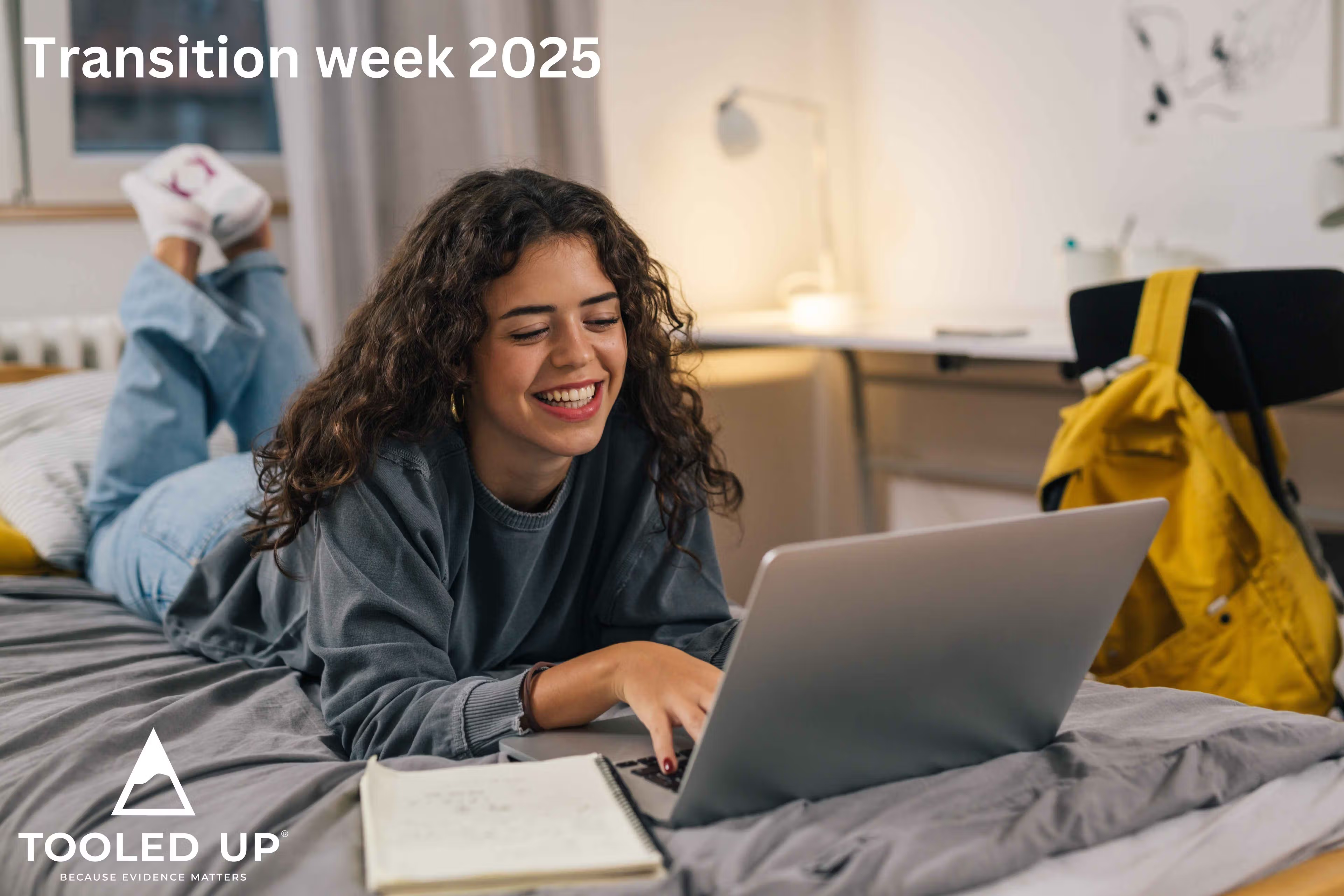
Moving to Boarding School: a parent's guide to supporting your child on their next adventure
5 Jun 2025 / 19:30 - 20:30pm BST
Dr Kathy Weston

Netflix's Adolescence: Action Points for Parents and Educators of Girls
10 Jun 2025 / 19:00 - 20:30pm BST
Dr Kathy Weston

Supporting Your Teen with Transition to University Life
3 Jul 2025 / 12:30 - 13:30pm BST
Dr Kathy Weston and Dr Hope Christie
Wednesday Wisdom
Tooled Up tips for loving parents around the world.
Reflect
Motivate
Support

May 07, 2025
A Victory for Values
Send tea! I’m in the middle of the notorious ‘double’; the year where two teens in the same household face high stakes exams. My boys have 32 exams over the next month and a half. All the while, parents like us have households to run, personal and work commitments to battle through! It is tough to keep everyone healthy and calm.

Apr 30, 2025
Wisdom Worth Sharing
Did you know that the consumption of energy drinks has been linked to mental health problems in teens? That encouraging adventurous play can reduce the risk of childhood anxiety? That fun isn't a luxury, but a developmental necessity? That dinnertime chats can uniquely boost children's executive functioning? Or even that engaging with music is correlated with greater empathy and kindness?

Apr 23, 2025
Good Enough
This week, Wednesday Wisdom is written by Dr Tara Porter, clinical psychologist and best selling author. Her latest book, "Good Enough: A Framework for Modern Parenting" was published earlier this month.

May 07, 2025
A Victory for Values
Send tea! I’m in the middle of the notorious ‘double’; the year where two teens in the same household face high stakes exams. My boys have 32 exams over the next month and a half. All the while, parents like us have households to run, personal and work commitments to battle through! It is tough to keep everyone healthy and calm.

Apr 30, 2025
Wisdom Worth Sharing
Did you know that the consumption of energy drinks has been linked to mental health problems in teens? That encouraging adventurous play can reduce the risk of childhood anxiety? That fun isn't a luxury, but a developmental necessity? That dinnertime chats can uniquely boost children's executive functioning? Or even that engaging with music is correlated with greater empathy and kindness?

Apr 23, 2025
Good Enough
This week, Wednesday Wisdom is written by Dr Tara Porter, clinical psychologist and best selling author. Her latest book, "Good Enough: A Framework for Modern Parenting" was published earlier this month.

Dr Kathryn Hesketh and Professor Helen Dodd
UKRI Future Leaders Fellows
Dr Kathryn Hesketh (pictured) is a Behavioural Epidemiologist and Principal Research Fellow at University College London. She is an expert in movement behaviours during the transition to parenthood and during the first five years of life, seeking to understand how we can better promote physical activity and play during pregnancy, postnatally, and in the preschool period.
Professor Helen Dodd is Professor of Child Psychology at the University of Exeter Medical School. She is an expert in children’s play and mental health, with a particular interest in child anxiety.
Dr Hesketh and Professor Dodd have recently published the results of the British Preschool Children’s Play Survey, which aimed to assess when, where and how adventurously young children in the UK are playing.
Dr Kathryn Hesketh and Professor Helen Dodd
UKRI Future Leaders Fellows
Encouraging adventurous play in the preschool years
Read the articleOur impact
Parenting topics covered
Countries
Schools and Companies
Resources
Community members
Parenting Question of the Month
“My 10 year old is experiencing big emotions. Do you have any advice?”
“We've asked Dr Sophie Nesbitt, Consultant Child Psychologist, for her top tips.”

Dr Sophie Nesbitt

Mar 17, 2025
Netflix's Adolescence: related resources in Tooled Up
Have you watched Adolescence on Netflix? Do you want to learn more about the issues raised? We have webinars and podcasts available to everyone, along with CPD and classroom resources available to Tooled Up teachers.

Oct 10, 2024
Tooled Up supports Bank of Ireland's 'Wild Child' campaign
Here at Tooled Up, we are really excited about our ongoing partnership with Bank of Ireland and we're very proud to have worked on a two-month long initiative aimed at supporting Bank of Ireland employees and their families. The ‘Wild Child’ campaign was a weekly digest delivered directly to BOI staff through August and September 2024, offering a range of resources, tools and support and for staff and their families.

Sep 09, 2024
Have smartphones and social media led to an anxious generation?
In this analysis, Dr Margarita Panayiotou, Senior Lecturer in Quantitative Methods in the Institute of Education at The University of Manchester, goes beyond the headlines to consider what the evidence really shows about the impact of smartphones on young people's mental health.

Mar 17, 2025
Netflix's Adolescence: related resources in Tooled Up
Have you watched Adolescence on Netflix? Do you want to learn more about the issues raised? We have webinars and podcasts available to everyone, along with CPD and classroom resources available to Tooled Up teachers.

Oct 10, 2024
Tooled Up supports Bank of Ireland's 'Wild Child' campaign
Here at Tooled Up, we are really excited about our ongoing partnership with Bank of Ireland and we're very proud to have worked on a two-month long initiative aimed at supporting Bank of Ireland employees and their families. The ‘Wild Child’ campaign was a weekly digest delivered directly to BOI staff through August and September 2024, offering a range of resources, tools and support and for staff and their families.

Sep 09, 2024
Have smartphones and social media led to an anxious generation?
In this analysis, Dr Margarita Panayiotou, Senior Lecturer in Quantitative Methods in the Institute of Education at The University of Manchester, goes beyond the headlines to consider what the evidence really shows about the impact of smartphones on young people's mental health.
Testimonials
I’ve recently received a lot of positive feedback about Tooled Up resources. A parent wrote to me ‘The quality, relevance and tools available make my cleaning time in the kitchen listening to one of the podcasts at night an absolute pleasure'. The recent resource on war worries has also been so helpful to us.

St Christopher's School
Headteacher
Dear Rhonda, talking to you has been a blessing. I felt really understood and validated. You are very kind, empathetic and thoughtful, but professional at the same time. Thank you so much for your advice and for all the information you sent me.

John Colet School
Parent
Thank you so much for your webinar last night. It really struck the right chord with this age of parent, and they found it very helpful. As Karen said, we are very fortunate to be a part of Tooled Up and have access to all the fantastic resources you work so hard to provide.

Heatherton
Teacher
‘I think it's a fab resource that we're very lucky to have - I was blown away by the talk when it launched and the breadth of resources available, but this is the first time that I've really used it. It's very easy to navigate, I love that there are audio tools available that I can listen to while doing things around the house, and now that I've gotten into the swing of using it, I will definitely be using it more regularly.’

Holme Grange School
Parent
I wanted to send a message to our headteacher to say thank you for signing MHS up to Tooled Up Education and for giving the opportunity to parents to access their resources freely. I really enjoyed the webinar yesterday. I like the fact that all the resources are based on academic research and that there are practical tips and short videos for busy parents. I had been looking for something like this for a while!

The Mulberry House School
Parent
Tooled Up has been an incredibly impactful resource for our parents, our teachers and ultimately, our pupils. To have practical advice, based on the most up to date research, on such a wide range of topics, has been invaluable and it has strengthened our partnership with parents.

Haberdashers’ Boys’ School
Head of Prep and Pre-Prep
I am truly amazed at the depth and value of the information provided. This is such an incredible resource for us to parent our girls.

Maltman’s Green School
Parent
Tooled Up is in the water here now from the Pre-Prep to the Sixth form. It has a great impact through our work with parents, pupils, and our continuing professional development programme for staff.

Berkhamsted Schools Group
Deputy Head – Pupil Wellbeing and Personal Development
I feel like I have found what I have been looking for for so long! I am so relieved to get very practical, relatable advice.

Methody School
Parent
It takes a village to bring up a child so for us to be able to support parents through the Tooled up resources is invaluable. Parents get access to leaders in a whole range of fields as well as easy to read summaries and resources they can use at home.

The Grammar School at Leeds
Teacher
You have no idea how much I value Tooled Up. I love my job, I love the children; however, we are constantly facing issues we haven't anticipated. Now we have you. It's so great to have a link to proper researched answers. Having you on board makes it easier to reassure parents. It is beyond helpful for all our staff.

Chepstow House School
Assistant Head Wellbeing
Thank you for all you provide. It has made a significant difference for us and I look forward to more talks and webinars in the new year.

Shrewsbury House School
Executive Head
There are so many great resources and presentations available on TooledUp that staff use as well as we tend to signpost specific topics for example “Getting School Ready” Guide for new parents. Staff love the fact that they can direct parents to expert information on anything from “allergies/separation anxiety/bed wetting” as well as the conversation guidelines. We joined Tooled Up this time last year and it has been fantastic.

Woodford Green Prep
Teacher
I have had such good feedback already and one of my colleagues who is sadly leaving us, is interested in this for her new school potentially. We are excited about being a ‘Tooled Up’ school and have been talking about it with parents already.

Downe House School
Deputy Head
Tooled Up Education has been fantastic. Your work has had and has a really massive effect on our parents and also our staff

Beechwood Park School
Teacher
I have been using your resources as a parent at Francis Holland Regent's Park and firstly, I would like to say a huge thank you - I find all of your resources, webinars, etc, so refreshingly clear, topical and helpful. It is as if you are living in my house some days!

Francis Holland Regents Park
Parent
Thank you so much for providing us parents with the opportunity to guide our children in the best possible way.

St. Catherine’s British School - Athens
Parent
With my child, Tooled Up has been great. We have just completed the family values activity and it was insightful but also great fun. My older daughter is at another school and recently had a separate issue. Tooled Up have been great in supporting us with this. I think it's great that the school is supporting the parents and staff in helping the pupils further.

The Haberdashers' Boys' School
Parent
I was thrilled to hear that my son’s school had signed up for Tooled Up! I loved your talk at the school and have really appreciated your Wednesday Wisdom every week since! Thank you So much! Keep up the great work!

Belfast High School
Parent
I just wanted to say thank you so much for organising the Tooled up webinar this evening for years 7-9. It was absolutely fantastic and I feel so lucky and grateful that Roundwood has provided this to support parents. This is a game changer and I can’t believe how many resources there are . Thank you so much again

Roundwood School, Harenden
Parent










